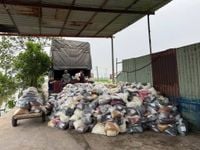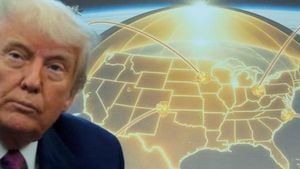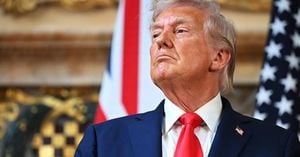In a week marked by significant developments in Vietnam's business and regulatory landscape, notable figures such as billionaire Pham Nhat Vuong and other industry leaders have made headlines with their insights and strategic moves. The ongoing challenges posed by counterfeit products also came to light, prompting discussions about market integrity and consumer safety.
One standout story from the week involves a TikTok Shop store named Hằng Du Mục, which reported an impressive revenue of 58.1 billion VND in the first quarter of 2025. This figure represents a staggering 312% increase compared to the same period in 2024. Additionally, products distributed by the Hằng Du Mục brand achieved a revenue of 58.7 billion VND, marking a remarkable 434% rise. This surge highlights the growing influence of social media platforms on retail sales in Vietnam.
At the recent General Meeting of Shareholders for SHB bank, Chairman Do Quang Hien expressed optimism about the prospects of Vietnam's real estate sector, describing it as highly promising. He emphasized the potential of real estate projects funded by the bank, noting their effectiveness and safety. Concurrently, Vingroup Chairman Pham Nhat Vuong echoed these sentiments, stating that the real estate market is showing clear signs of recovery. He projected a significant increase in the company's real estate revenue, reflecting a broader trend in the industry.
On April 23, 2025, the inaugural ESG Vietnam Forum took place, focusing on sustainable development strategies in the new era. Experts discussed the critical role of Environmental, Social, and Governance (ESG) practices in business operations. Nguyen Van Khoa, CEO of FPT, spoke about the company's successful implementation of ESG practices, asserting that they are no longer merely a trend but a fundamental aspect of sustainable growth. Leaders from TH Group also emphasized that sustainable development is not just a corporate responsibility but a strategic advantage in a competitive market.
During the same forum, Pham Tuan Anh from the National Oil and Gas Group (PVN) highlighted that sustainable development has evolved from a theoretical concept to an essential requirement in today's business environment. PVN has been publishing an annual sustainable development report since 2015, adhering to international standards such as GRI, demonstrating their commitment to transparency and responsibility.
In a significant move, Vinhomes announced a revenue target of 180,000 billion VND (approximately 6.93 billion USD) for 2025, a 75.9% increase from 2024. The company aims for an after-tax profit of 42,000 billion VND (around 1.62 billion USD), reflecting a 19.7% increase compared to the previous year. On April 24, Vingroup set an even more ambitious revenue target of 300,000 billion VND for 2025, with an after-tax profit goal of 10,000 billion VND, indicating a robust growth strategy driven by innovation and hard work, as articulated by Vuong.
In a related development, Dang Hong Anh, the founding chairman of TTC Land, announced his resignation to focus on long-term strategies within the TTC Group. This transition had been planned for one to two years and is part of the company's developmental roadmap.
On the regulatory front, the fight against counterfeit products took center stage as Nguyen Bach Diep, Chairman of FPT Retail, praised authorities for uncovering organizations involved in producing fake medicines and functional foods. She stressed the importance of transparency in the market, advocating for fair competition and ethical practices. Diep stated, "We firmly oppose counterfeit products, and we welcome efforts to expose those responsible for such unethical practices."
In a separate but related case, the Investigation Police Agency (C03) of the Ministry of Public Security initiated legal proceedings against a network involved in the production and trading of counterfeit food and health supplements. On April 26, authorities announced the indictment of several individuals, including Nguyen Nang Manh, Director of MegaPhaco, and Do Manh Hoang, Director of MediPhar. The investigation revealed that this network has been operating since 2016, establishing multiple companies to legitimize the production and distribution of fake functional foods.
Authorities seized approximately 100 tons of counterfeit products, with over 900 brands targeted primarily at vulnerable populations, including the elderly, children, and pregnant women. Although these products were marketed as being imported from the United States and Europe, most of the raw materials were sourced from China. The network's operations, which included a raw material import company and several production and distribution firms, have been in place for nearly a decade.
In light of these developments, Thượng tá Hồ Văn Hùng, head of the Economic Crime Investigation Department, remarked on the scale of the operation, stating, "This network, led by Nguyen Nang Manh, has established a massive production system. They have created a facade of legitimacy through various companies since 2015, and we are continuing to investigate further."
As discussions around consumer safety and market integrity continue, stakeholders across various sectors are urged to remain vigilant against counterfeit products. The recent events underscore the importance of regulatory oversight in safeguarding public health and maintaining fair competition in the marketplace.
In the retail sector, Nguyen Duc Tai, Chairman of Thế Giới Di Động, addressed concerns regarding product safety, specifically in relation to the use of chemical preservatives in food items. He emphasized the necessity of stringent quality control measures and indicated that Bach Hoa Xanh, a subsidiary of Thế Giới Di Động, would transition to sourcing products from manufacturers with rigorous safety protocols.
As Vietnam's economy evolves, the interplay between robust business strategies, regulatory frameworks, and consumer safety remains critical. The current landscape reflects a dynamic environment where innovation, ethical practices, and transparency are paramount.




